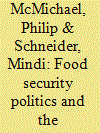| Srl | Item |
| 1 |
ID:
085940


|
|
|
|
|
| Publication |
2009.
|
| Summary/Abstract |
The global development project faces newly evident challenges in the combination of energy, climate and food crises. Their interrelationships create a powerful moment in world history in which analysts and practitioners grope for solutions, limited by the narrow market episteme. This contribution argues that official development, in advocating green market solutions, recycles the problem as solution-a problem rooted in the geopolitics of an unsustainable global 'metabolic rift' and a discourse of global ecology reinforcing international power relations through monetary valuation, and deepening the North's 'ecological debt'.
|
|
|
|
|
|
|
|
|
|
|
|
|
|
|
|
| 2 |
ID:
105156


|
|
|
|
|
| Publication |
2011.
|
| Summary/Abstract |
This article reviews proposals regarding the recent food crisis in the context of a broader, threshold debate on the future of agriculture and food security. While the MDGs have focused on eradicating extreme poverty and hunger, the food crisis pushed the hungry over the one billion mark. There is thus a renewed focus on agricultural development, which pivots on the salience of industrial agriculture (as a supply source) in addressing food security. The World Bank's new 'agriculture for development' initiative seeks to improve small-farmer productivity with new inputs, and their incorporation into global markets via value-chains originating in industrial agriculture. An alternative claim, originating in 'food sovereignty' politics, demanding small-farmer rights to develop bio-regionally specific agro-ecological methods and provision for local, rather than global, markets, resonates in the IAASTD report, which implies agribusiness as usual ''is no longer an option'. The basic divide is over whether agriculture is a servant of economic growth, or should be developed as a foundational source of social and ecological sustainability. We review and compare these different paradigmatic approaches to food security, and their political and ecological implications.
|
|
|
|
|
|
|
|
|
|
|
|
|
|
|
|
| 3 |
ID:
121782


|
|
|
|
|
| Publication |
2013.
|
| Summary/Abstract |
In the context of the world food crisis 'value-chain agriculture' is emerging as a new frontier of publicly subsidised corporate investment, incorporating smallholding farmers into commercial relations to redress apparent food shortages. This paper conceptualises value-chains as technologies of economic and ecological power, using cross-regional case studies to explore the impact of debt relations in extant value-chain relations. While the value-chain project envisioned by the development industry in partnership with the private sector is geared to 'feeding the world' the likely outcome is (differentiating) smallholders serving corporate markets at the expense of local food security. I argue that developmentalists seek to resolve the crisis through a 'spatio-temporal fix', enclosing smallholders in value-chain technologies financed through debt relations that appropriate value from smallholder communities. At the same time some farmers are seeking to avoid the debt trap by developing strategies to decommodify farming practices to preserve and revitalise their farms as creators of ecological values, rather than simply converters of economic value.
|
|
|
|
|
|
|
|
|
|
|
|
|
|
|
|